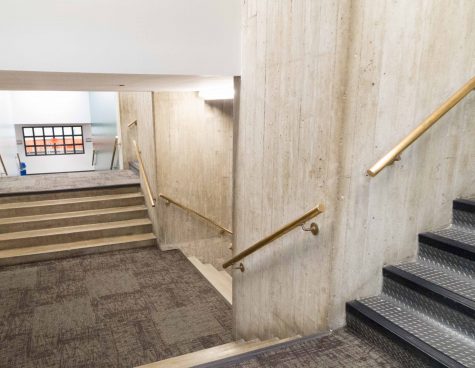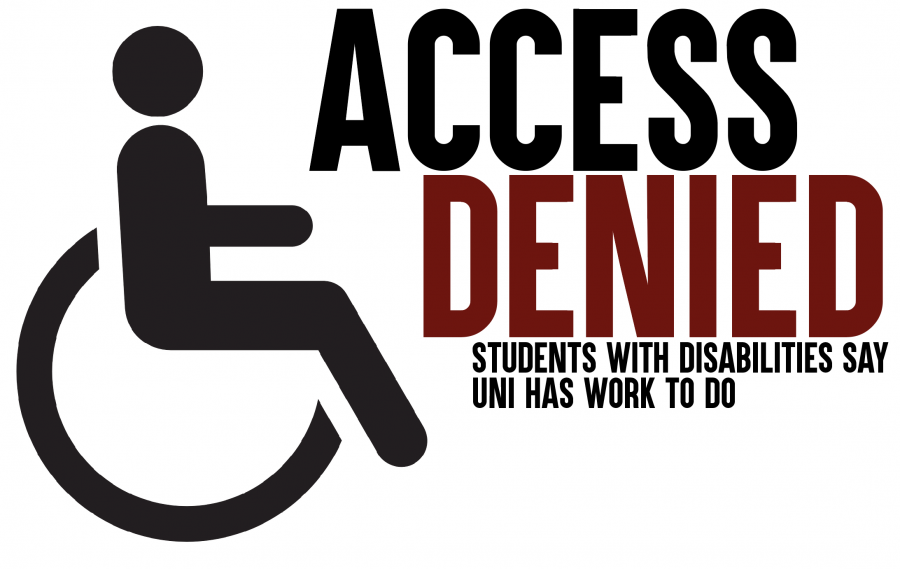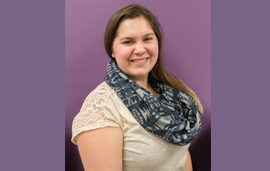Access Denied
Mar 30, 2017
When Kyle Waterman, a freshman math and actuarial science major, wants to visit his friends on the second floor of Campbell Hall, he has to have one friend carry him up the stairs and one friend carry his wheelchair.
“It’s really annoying,” Waterman said. “The dorms are terrible for people in wheelchairs.”
According to Waterman, he can also barely get into the bathrooms in Bender and Dancer Hall.
Waterman is one of several students with disabilities on campus who says that UNI has a lot of improvements to make.
According to the Americans with Disabilities Act of 1990, any physical or mental impairment that substantially limits one or more major life activities is considered a disability.
According to Kelly Gibbs, the coordinator of Student Disability Services, says 744 students, six percent of UNI’s total population, are receiving formal accommodations through the Student Disability Services. Differently abled students are classified by five ability zones including: sensory, mobility, chronic health, learning disabilities and psychiatric.
According to Gibbs, Student Disability Services provide many different accommodations to those who need extra assistance both in and out of the classroom. This includes but is not limited to: Note-taking assistance, interpreters, mentoring, counseling, housing accommodations and other accommodations.
“Every student has an equal opportunity and we all have a legal obligation to fulfill this public service,” Gibbs said.
Gibbs emphasized that although the Student Disability Services could always do more to keep up with the rising population of disabled students, she thinks UNI is doing a pretty good job thus far. One of the biggest issues, however, is educating people about the fundamentals of disability. Many people can easily be trained on how to recognize a disability and how to cordially interact with those who do have disabilities, according to Gibbs.
Student Disability Services has found a few ways to both educate students without disabilities and make those who are disabled feel more inclusive and supported. Gibbs said that the office is trying to start up unofficial student groups where they get together and talk about their lives, their disability, and just hang out. Gibbs thinks it would be a great way for students to network with others who are living with the same disability.
“Some students feel like they’re the only ones who are dealing with these problems,” Gibbs said. “When in fact, about 7 percent of students have a disability of some sort.”
According to Gibbs, Student Disability Services will be training Cat Crew Student Admissions and the Rod Library Staff on disability education and awareness specific to student interactions with those departments.
Steven Blair, a Kinesiology graduate student, is legally blind.
According to Blair there are some parts of campus that are easy to access, and others need work. “The accessibility part that I really like about campus is that when you get past the bridge that goes over Hudson, it’s really all sidewalks,” Blair said. “As far as technology accessibility, the library is a really good place.”
According to Blair, the library could improve its accessibility by providing software on the computers, such as text-to-speech, but the staff is helpful and prompt in assisting students with disabilities.
“I would say the Maucker Union is not very friendly,” Blair said. “It is just a maze in there. Once you want to go down the stairs to the bottom floor or wherever, there’s so many nooks and crannies — so I’d say that Maucker Union is not as accessible as I’d like.”

Pictured is the lower level of Maucker Union. The lower level is abundant with small staircases.
Making the Union more accessible is a relatively simple fix, according to Blair.
“Just as simple as saying, ‘Okay, we’re going to put the tables in columns and rows,’ to where everything is lined up so that now we have walkways,” Blair said. “Instead of walking forward and missing this table on my right, but if I go 10 more feet, I’m going to run into a table.”
According to Blair, UNI has good accessibility overall, but there is always room for improvements.
“The fact that this campus is its own little community helps me out,” Blair said. “But there are always ways to improve, starting with technology and trying to figure out how to organize things in buildings better.”










